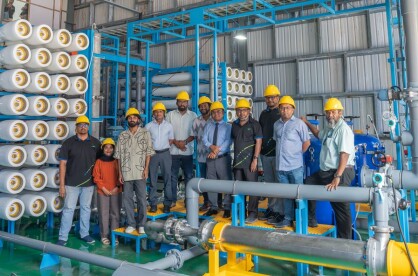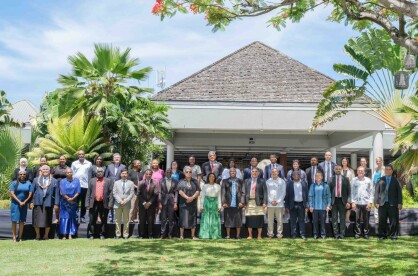Decentralising education
It is time to prepare and meaningfully invest in a plan to decentralise the schools in the country.

Source: Ministry of Education
It is time to prepare and meaningfully invest in a plan to decentralise the schools in the country.

Source: Ministry of Education
The Organisation for Economic Co-operation and Development (OECD) defines decentralisation as measures that transfer a range of powers, responsibilities and resources from central government to subnational governments. There can be various political, administrative and fiscal motives for decentralisation reforms. In some countries, decentralisation can be seen as a counter-reaction to previous strong centralisation and even authoritarianism. In other countries, decentralisation has been a method to reform the public sector, in order to improve the efficiency of public services and thereby curbing the growth of government spending. Decentralisation of authority is also often expected to result in more accountable and transparent public governance, lower corruption, higher political participation and policy innovation
Since the Nasheed Administration kickstarted the decentralisation process by forming seven Provincial Authorities through executive action, the need and plans for decentralisation has been reiterated by subsequent presidencies in varying degrees. In fact, speaking at the opening ceremony of the first edition of “Viavathi Raajje” Councillor conference in 2019, President Ibrahim Mohamed Solih said that, ‘bringing national development, peace and stability to the country and its people through decentralisation’ is the most significant pledge made by his administration. In fact, in March of 2021, President Solih echoed this same sentiment. While delivering the keynote address at the opening session of the 'Decentralisation Policy Coordination Conference', the President further stated that ‘decentralised governance empowers citizens to direct the development of their island.’
Chapter VIII of the Constitution provides for the decentralised administration of the Maldives. Ratified in 2010, the Decentralisation Act (Act no: 07/2010) governs the powers and responsibilities of the local authorities empowered to carry out certain functions as set out in the Act. Since then, nine amendments have been brought to the Act, where the last amendment was ratified in December 2020.
Local Government Authority (LGA) is a state institution established under the Decentralisation Act to regulate, oversee and develop the local governance system of Maldives as envisioned in the Constitution.
The Constitution identifies “education without discrimination of any kind” as a basic right and that primary and secondary education shall be freely provided by the state. Mandated by the Decentralisation Act, City and Island Councils provide pre-school education and organise and conduct educational and vocational programs to train adults. However, formal basic education (primary, secondary and higher secondary) was not listed as a service that would be decentralised to Councils.
A UNICEF commissioned study undertaken in 2013 underlined that the process of decentralisation was not completed. It also noted that Atoll and Island Councils felt they have significantly less powers and less opportunities to raise revenue, and provide services than they did prior to 2008, despite the grand visions in the Decentralisation Act.
By the year 2018, only a very few primary schools and preschools were run by the local communities (community schools). This shows that the Decentralisation Act is not fully implemented, but changes were made, with the argument that this would help to offer quality services (including education services) in a more equitable way, under a more systematic approach.
One of the key drawbacks of centralised systems is that of red tape, hampering efficiency and effectiveness. The hierarchy of decision making and approval slows the process and makes it bureaucratic.
Councils, monitored by the Ministry of Education (MoE) are in a unique position to make quick decisions, without having to wait days, weeks or even months, for approval from the central ministry.
As the Maldives Education Sector Plan is expiring by 2023, this is perhaps a fitting time to think about truly decentralising the education sector, not at just the preschool level. This could align well with one of the Key Performance Indicators (KPIs) of the sector, Goal 4 – which refers to the ‘System Strengthening for Efficiency and Quality Schools for All’.
There has been some work done in this regard. MoE has a policy pledge related to decentralisaton. It states that based on the population, the capacity, and the available resources in the islands, a suitable educational delivery system ‘Jazeera Madharusa’ (Island School) is to be established. All the schools will be operated by the facilitation of the school board, under the responsibility of the local councils. Delivery mechanisms such as multi-grade schooling and other modern educational delivery mediums will be introduced in those schools which have few numbers of students. All schools will run as single-session schools.
According to a 2012 publication by the World Bank, a recommendation had been put forth for the decentralised delivery of a quality assurance program. Quality assurance provides a framework for the systematic review and monitoring of an education system to determine whether an acceptable standard of quality is being achieved over the medium- term, and enhanced over the long-term in line with global developments in education.
Given the geography of the country with multiple and scattered islands, centrally driven quality assurance processes such as quality assurance inspections can be expensive. As such, the decentralised levels of the education system, especially atolls and islands, will need to implement nearly all the activities for the quality assurance program to be cost- effective. The program will also have to rely heavily on self-assessments by schools, with external reviews taking place according to a time cycle that is affordable. The MoE will needs to develop on-line tools that can support the atolls, islands and schools to implement the quality assurance program efficiently.
Perhaps setting up quality assurance centers across four major areas in the country can establish monitoring focal points for the schools of the respective region. This can be closely integrated with the already established Teacher Resource Centres (TRC’s) in each atoll.
Decentralisation comes with its own benefits and challenges. However, with this being a presidential pledge on the table, it is time to prepare and meaningfully invest in a plan to decentralise the schools in the country. Given the country’s geography, it only makes sense to move past the centralised system and pledge the authority to the Councils.



